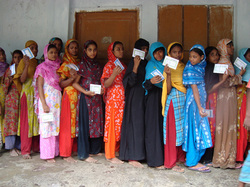
A number of NGOs, hundreds of development projects and plenty of mission statements dedicate themselves the empowerment of women and girls in developing countries. One NGO that I worked alongside in Senegal is called Tostan. Tostan has been working with women and girls in rural areas of Senegal for nine years and prides itself in the emphasizing the community of community-led development.
Empowerment has a pretty wide and rather vague definition, though, and outcomes of empowerment can be quite difficult to measure. And then there's the debate about if an organization is 'empowering women,' then any household or behavioral changes may not be truly organic within an individual, and how sustainable are these changes? For one of my development classes, I came across a critical narrative written by a collective of Indian women called Playing With Fire. Most of the women are employed for an NGO dedicated to empowerment of women, but the authors criticize the methods and implementation of empowerment.
As the debate on empowerment ensues, I'm looking forward to the results of this randomized experiment in Bangladesh at JPAL. The authors of the study will be comparing types and levels of empowerment, including the rights-based approach (similar to Tostan's methodology) to other more extensive training (financial literacy, education and vocational training, health information, and incentives for delay of marriage). I am curious about the timeframe for this study, though, because it seems that some results of empowerment may last (or not even show until) years after the study.
As the debate on empowerment ensues, I'm looking forward to the results of this randomized experiment in Bangladesh at JPAL. The authors of the study will be comparing types and levels of empowerment, including the rights-based approach (similar to Tostan's methodology) to other more extensive training (financial literacy, education and vocational training, health information, and incentives for delay of marriage). I am curious about the timeframe for this study, though, because it seems that some results of empowerment may last (or not even show until) years after the study.
 RSS Feed
RSS Feed